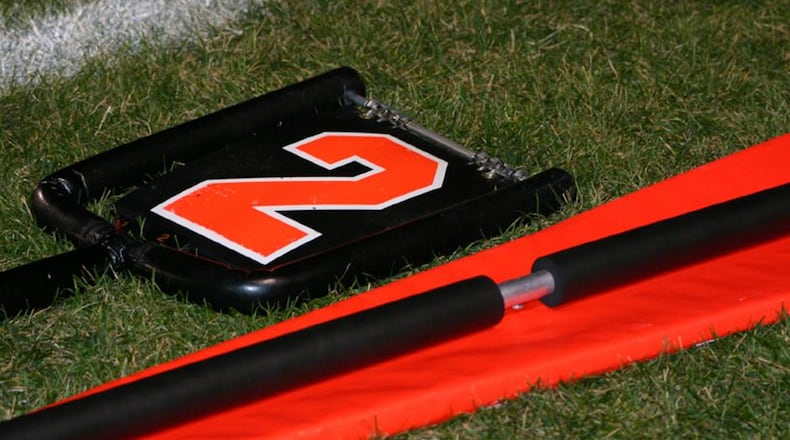GHSF Daily's Four Questions feature historically poses the same questions to a different Georgia head coach each issue. This season, head coaches are being asked Four Questions tailored to current events. Today's interviewee is Creekside head coach Maurice Dixon, whose team beat defending Region 5-AAAAAA champion Mays 49-48 last week. Dixon in 2017 inherited a trouble program that was rocked by the death of a young player. His first team was 0-10. His second is 4-3.
Maurice Dixon, Creekside head coach
1. Sounds like you had a wild game Friday. What were the key moments? "We jumped out on them early after making a few big plays. Mays is a great program. I knew they would fight back. When we went into half, we made some great adjustments, and I reminded our kids of how hard they had worked in the offseason, that it would be the difference in the game. Mays went up 34-21 with about 30 seconds left in the third quarter, but Lazarus Anderson connected with Julian Perkinson for a touchdown as time was expiring. Then Taj Dodson forced a fumble. Terrell Miller picked it up and scored, putting us up 35-34. After that, we went back and forth. We got the ball with about 6:30 left, down 48-42. Fifteen run plays later, Tyler Malone scored and Devari Best hit the PAT."
2. Why was it big for your program? "The significance is that we are alone in second place in the region and control our destiny. It was a big win because it was the next win. We try to focus on one game at a time. Always forward."
3. It has been a great turnaround for Creekside. What has been the difference this season? "We've had a full offseason. I took over last year after the dead week [in July]. I walked into a program that had just gone through possibly the worst six months possible, from over 15 kids transferring, to the young man passing away. [Kamari McGowan, a freshman, died after becoming ill during conditioning drills in May of 2017.] The kids were hurt, and community support was starting to waver. When we came in, we were empathetic but came in and set the tone, not only throughout the football program but also in the school. The idea was to 'Commit to the C,' meaning doing everything the right way. Perfect attendance and perfect effort always equals positive outcomes. Because we had lost so many kids, we were very young. I joke that we had a good JV team playing varsity football. We had good players, but they were young, weak, inexperienced and lacked confidence to win. The one thing I'd say is they remained loyal and trusted the process. We committed to coming to practice every day. We lifted four days a week. And though we didn't win any games, the kids grew and got stronger and committed themselves to being scholar-athletes. One week after the season, we started workouts with 35-40 kids. The numbers grew to 60-65 during the summer. We really pushed them to become bigger, stronger and faster and were able to compete against some good programs over the summer. I knew we had a chance to be good. I scheduled tough non-region games to see where we were early so we could adjust before region play. Since region play has started, the focus has been on no turnovers, no big plays, playing disciplined, unleashing brutality every play. We still haven't put it all together, playing four full quarters of Creekside football, so there is still more work to do."
4. While going 0-10 as a first-time head coach, did you doubt yourself? Did you worry what the community and others were thinking? And do you feel validated now? "I graduated from Creekside in 2001 and was part of some great teams, so I understand the expectations and tradition of Creekside football. I was well aware that I was taking over a program in turmoil, and there were people in the community that didn't want Creekside to be successful. I knew all those things and knew I had the support of my principal, Ronald Maxwell, and athletic director, Mekia Troy. I made it a two-year process. I played young guys, removed a lot of negative entities, and went out into the community and repaired some key relationships that were worth saving. The kids committed to the process, so my outlook was always positive. On the outside looking in, it's so easy to see 0-10 and think we didn't know what we were doing, but for the program to reach its potential, it had to hit rock bottom. I've never been the person to listen or care about what others think, so the naysayers never bothered me, and I try to instill confidence in my players, so it doesn't bother them. We let the haters be our motivators, and believe me, we had a lot of fuel to be great. Would you believe we had teachers in our own building that talked about us? That's crazy. Now that we're starting to win, I always remind them to remember who was with you from day one, and while we should forgive, never forget. There is no feeling of validation on my end. The work's not done. I live in Palmetto so, this is my community. My son plays youth football for the Fairburn Flames just like I did, and my daughter cheers. I feel connected not only to the success of the program but also the kids because I'm living proof that you can be successful when you Commit to the C."
Produced by Georgia High School Football Daily, a free e-mail newsletter. To join the mailing list, click here.
About the Author
The Latest
Featured

